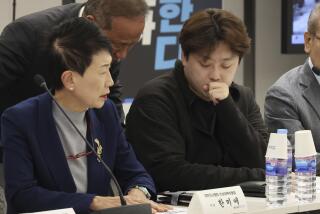China extends looser rules for media
In a modest move toward greater openness, China said Friday that it would permanently ease restrictions on foreign news media operating in the world’s most populous country.
Under the rules, signed by Premier Wen Jiabao, foreign journalists won’t need special government permission to travel in the country or interview Chinese citizens. Similar rules, in place temporarily during the Beijing Olympics held in August, were set to expire Friday.
“This is not only a big step forward for China in opening up to the outside world, said Liu Jianchao, a Foreign Ministry spokesman, at a midnight news conference, “it is also a big step for further facilitating reporting activities by foreign journalists.”
Foreign analysts and news groups welcomed the change but said China has a way to go in crafting a modern, open society. The government retains a tight grip on the domestic press. Tibet travel remains off-limits without a permit. And China still has less obvious ways to control information.
“I think it’s positive,” said Xiao Qiang, director of the China Internet Project at UC Berkeley. “But I wouldn’t exaggerate its significance.”
Reporters Without Borders, a Paris-based watchdog group, welcomed the announcement but called on China to reduce censorship, end news media restrictions on Tibet, increase reporters’ access to officials, allow Chinese journalists to work for foreign news media and protect Chinese sources, who are often beaten or jailed for speaking to journalists.
“If the changes are only on paper, it’s not enough,” said Lucie Morillon, the group’s Washington representative.
Analysts said China decided to make the rules permanent in part because it provides the communist government with some favorable publicity at relatively low cost.
The more open policy in no way weakens the firewall China maintains between domestic and foreign information. It gives a fillip to pro-reform officials in a government that is not monolithic. And it has been tested over the last year without seriously threatening the regime’s grip on power.
“The changes didn’t bring China into chaos,” Xiao noted.
The government can still seal off an area on national security grounds, as seen during the Tibet riots in March.
Also, analysts said, the government can continue to misinform, manipulate and stonewall reporters and intimidate, bribe or detain sources. It can also threaten Chinese staffers employed by foreign reporters.
Even under the relaxed rules for the Olympics, there were at least 30 cases of reporting interference, the Foreign Correspondent’s Club of China said.
The propaganda ministry is also becoming more skilled and subtle, placing less emphasis on absolute control in favor of a “main message” strategy that shapes the general direction of domestic coverage.
Its evolution has been spurred in part by social changes and by the Chinese Internet, which it can’t completely control despite advanced filtering technology and widespread use of cyber-police.
To the extent that the foreign news media have more freedom to report on Chinese riots, corruption, police brutality and other sensitive issues, Chinese citizens are increasingly able to read about them online as information “leaks” back onto the Chinese Web, analysts said.
--
More to Read
Start your day right
Sign up for Essential California for news, features and recommendations from the L.A. Times and beyond in your inbox six days a week.
You may occasionally receive promotional content from the Los Angeles Times.






